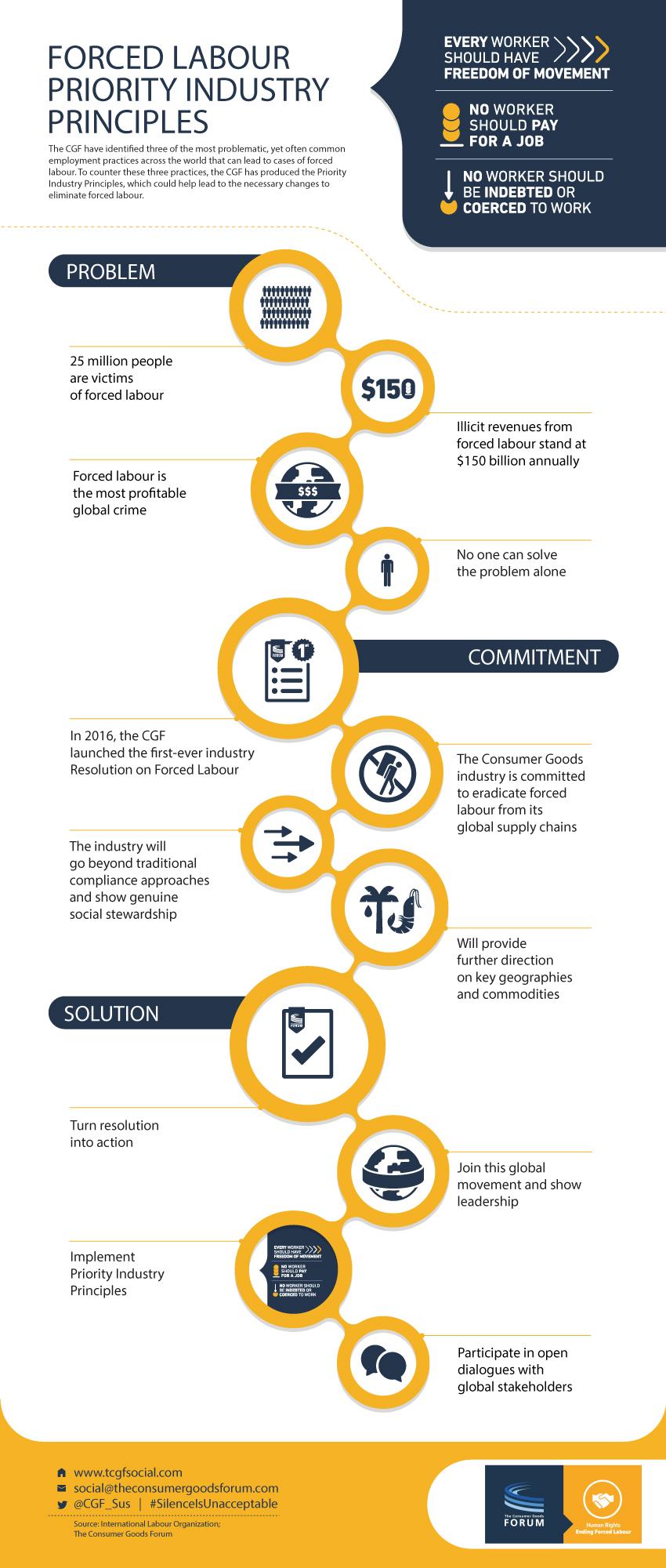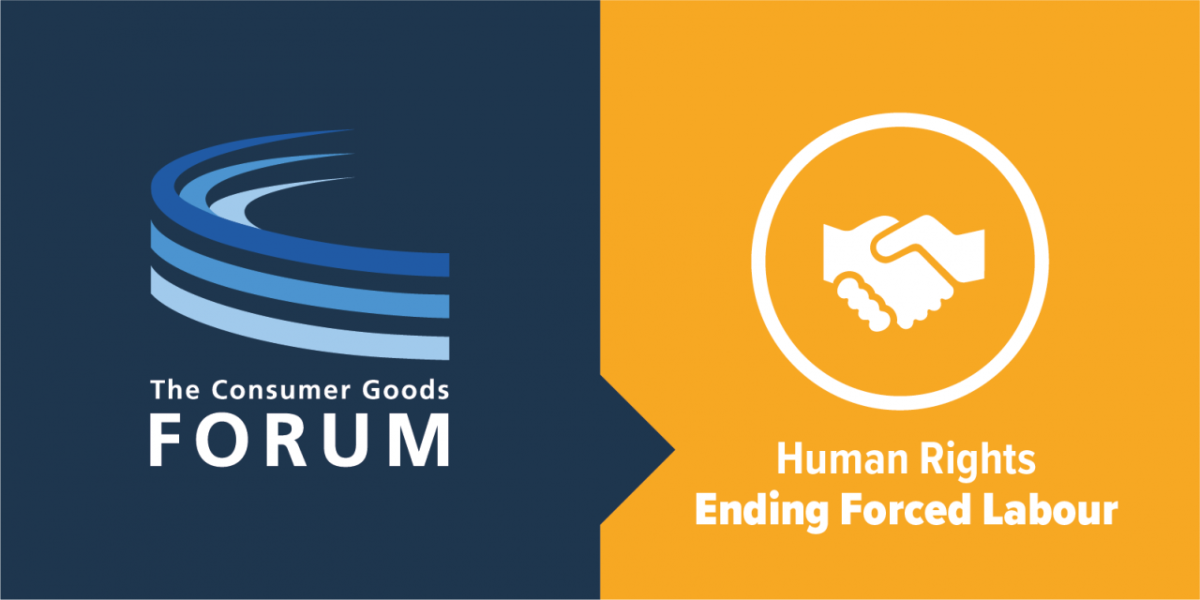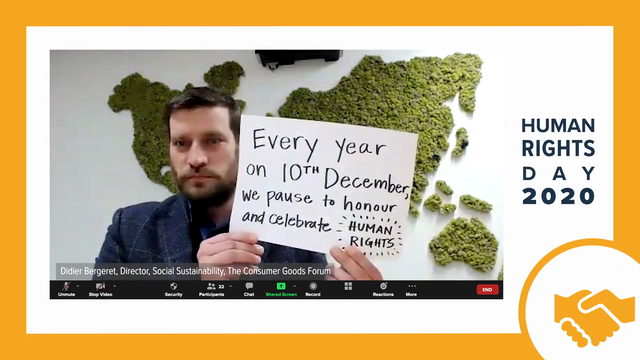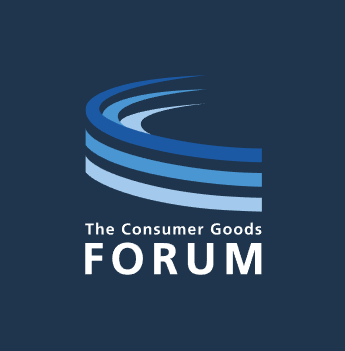Major Retailers and Consumer Brands Commit to Eradicate Forced Labour from Global Supply Chains with Launch of New Coalition of Action
- 20 of the world’s leading consumer goods companies, members of The Consumer Goods Forum, take collective action to address the challenge of forced labour in their supply chains
- In line with international agreements, Coalition members have developed a framework for deploying forced labour-focused Human Rights Due Diligence systems in their operations to identify, remedy and prevent forced labour risks and impacts
- Members to activate pre-competitive practices collectively support responsible recruitment markets, and to work specifically with palm oil suppliers to eradicate forced labour in the sector
PARIS, 10 December 2020 /3BL Media/ – Today, on annual Human Rights Day, 20 leading members of The Consumer Goods Forum (CGF) announce their collective stance against forced labour with the creation of the CGF’s new Human Rights Coalition – Working to End Forced Labour, a CEO-led initiative driving collaborative action and accelerated change. Building on the CGF’s five years of experience addressing the endemic problem of forced labour in the consumer goods industry, this new Coalition of manufacturers and retailers has committed to actions that, in line with international agreements and legislation, will help to fight against forced labour in the industry.
While there are numerous human rights risks to labourers worldwide, forced labour is one of the most salient, often being one of the most severe human rights abuses that leads to the infringement of other rights. With more than 25 million people experiencing some form of forced labour worldwide, including 16 million working in the private sector, it is a rife social problem that the CGF’s Human Rights Coalition is firmly committed to fighting. The Coalition is sponsored at the CGF Board level by Emmanuel Faber, Chairman and CEO of Danone, and Olaf Koch, CEO of METRO AG. It is chaired at the Steering Committee level by METRO AG.
The 20 members of the Coalition are:
- APP Sinar Mas
- Danone
- Essity
- Heineken
- L’Oréal
- Marks & Spencer
- Mars, Incorporated
- McCormick & Co.
- METRO AG
- Mondelēz International
- Nestlé
- PepsiCo
- RB
- Sainsbury’s
- Tesco
- The Coca-Cola Company
- The J.M. Smucker Company
- The Kellogg Company
- Unilever
- Walmart
The Coalition’s work is guided by the CGF’s Priority Industry Principles, which were developed to address the core drivers of forced labour:
- Every worker should have freedom of movement;
- No worker should pay for a job; and
- No worker should be indebted or coerced to work.
Guided by several key international agreements and resolutions, including the UN Guiding Principles on Business and Human Rights and other international frameworks including the ILO Declaration on Fundamental Principles and Rights at Work, the OECD Guidelines for Multinational Enterprises, and the United Nations Sustainable Development Goals, members of the Human Rights Coalition recognise the need to take tangible steps to translate these Priority Industry Principles into reality. To do so, they have developed an effective strategy to identify and address actual and potential forced labour risks and impacts in their own operations through the deployment of forced labour-focused Human Rights Due Diligence (HRDD) systems. Notably, the Coalition is also focusing its efforts on the risks for forced labour in the palm oil sector, given the commodity’s high demand in the industry but whose production also carries a high risk for human rights abuses.
Finally, as a collective of some of the world’s most powerful retailers and consumer brands, the Coalition recognises its role to have a real impact in the fight against forced labour. Together as a Coalition, members will activate pre-competitive practices and work with relevant actors to support responsible recruitment markets using the leverage of our own operations and collective engagement in selected geographies and commodities. In doing so, they aim to lend their voices to the growing conversation around ending forced labour by supporting transparency and disclosure efforts which acknowledge the risk of forced labour practices within the consumer goods industry, especially in their own operations, to share resources and lessons learned and encourage accountability. Additionally, the Coalition has continued the CGF’s rich history of engagement with various industry actors to drive positive change on this issue, with both its HRDD framework and Palm Oil Roadmap having been developed through extensive consultation with key stakeholders. The Coalition is also working closely with the CGF’s Forest Positive Coalition of Action on driving positive change in the sector, and the CGF’s Sustainable Supply Chain Initiative (SSCI) to build trust in sustainability standards worldwide.
The development of the Coalition comes at a critical point with workers’ rights, particularly in our industry, are increasingly being threatened by the ongoing Covid-19 pandemic, as workers needing employment may face unethical recruitment practices, including having to pay for jobs; migrant workers have been unable to travel freely; and essential workers have been front-line responders, often at the expense to their own personal health and safety.
Emmanuel Faber, Chairman and CEO of Danone, said, “Forced labour is a violation of the most fundamental human rights. We have a responsibility within the consumer goods industry to confront and fight it, especially in the current context when more and more people are becoming vulnerable. Given the systemic nature of the problem, we need a collective, multi-stakeholder approach based on understanding and addressing risks where they are the greatest. That’s what this coalition aims for.”
Olaf Koch, CEO of METRO AG, said, “Together, as a Coalition, we are developing frameworks to make our own operations and supply chains more sustainable so that the rights outlined in the Priority Industry Principles are respected, providing workers with just and fair employment, because all people deserve decent working conditions around the world. We’re committed to making that right a reality.”
Guy Ryder, Director-General of the International Labour Organization (ILO), said, “The effects of the COVID-19 crisis are jeopardising the progress made on the eradication of forced labour. We must act now to ensure we prevent an increase in the number of forced labour victims. In recognition of our collective goal to eradicate forced labour, ILO welcomes the launch of CGF’s Human Rights Coalition — Working to End Forced Labour and the commitment of the members of the Coalition to working to eradicate forced labour.”
--- Ends ---
#HumanRightsDay #SilenceIsUnacceptable
About the Human Rights Coalition – Working to End Forced Labour
The CGF Human Rights Coalition -- Working to End Forced Labour (HRC) is a CEO-led Coalition of Action from The Consumer Goods Forum. As an initiative of 20 of the world’s largest consumer goods companies, the HRC is committed to helping achieve fair and decent working conditions worldwide by eradicating forced labour from its supply chains. The work of the HRC continues the CGF’s long history of engagement on the issue of forced labour within consumer goods supply chains by building on the CGF’s Social Resolution on Forced Labour, the first of its kind in the industry; its Priority Industry Principles, and ongoing relationships with key stakeholders in the industry. For more information about the HRC, visit www.tcgfsocial.com.
About The Consumer Goods Forum
The Consumer Goods Forum (“CGF”) is a global, parity-based industry network that is driven by its members to encourage the global adoption of practices and standards that serves the consumer goods industry worldwide. It brings together the CEOs and senior management of some 400 retailers, manufacturers, service providers, and other stakeholders across 70 countries, and it reflects the diversity of the industry in geography, size, product category and format. Its member companies have combined sales of EUR 3.5 trillion and directly employ nearly 10 million people, with a further 90 million related jobs estimated along the value chain. It is governed by its Board of Directors, which comprises 58 manufacturer and retailer CEOs. For more information, please visit: www.theconsumergoodsforum.com.
Contact
Didier Bergeret
Director, Social Sustainability
social@theconsumergoodsforum.com
Madelaine VanDerHeyden
Communications Officer
m.vanderheyden@theconsumergoodsforum.com




